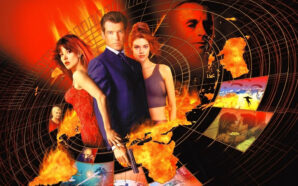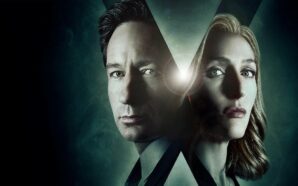Exactly one year ago, the conversation surrounding Game of Thrones changed dramatically with the airing of ‘The Long Night’. For the previous couple of seasons there was some slight negativity towards the fantasy series as it began to wrap up its epic narrative, but the third of six episodes in the final season swayed many positive fans towards anger and disappointment. Over the past couple of weeks, I’ve been revisiting the infamous final season away from the passionate fanbase and have been anxiously anticipating this episode from the beginning, trying to resolve my conflicted thoughts about it. It’s an episode that concludes storylines and character arcs like no instalment has previously, truly indicating that the end is near (if not already here), while also offering the most epic action set piece in the show’s history – maybe even in all of television history. Upon revisit, what I found was a truly spectacular chapter of the series marred by some narrative shortcomings; not style over substance but scale over substance.
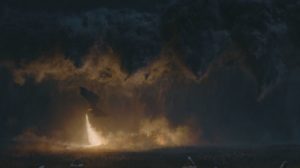 But what scale! It’s a phenomenally well-crafted 70-minute battle that’s truly thrilling. The level of visual craftsmanship on display from director Miguel Sapochnik and the legions of talented crew members is unbelievable. By the time the credits roll you feel exhausted, as if you’ve experienced the conflict for yourself, but thankfully the structure allows for moments of respite between the action. The pacing is near-perfect, intercutting storylines of armies battling fiercely in large open conflict with brawls between flying dragons, Arya trying to sneak past undead roaming the library like she’s in The Last of Us, and cadaverous threats in the crypt. It’s never boring but at worst the episode sometimes resorts to quick cuts of random slashes and bodies moving. It’s a technique done to disorientate the viewer and add a greater sense of mayhem and kineticism to the battle but sometimes they rely on it too often, a great shame considering the directing and editing masterclass of the other 95% of the episode.
But what scale! It’s a phenomenally well-crafted 70-minute battle that’s truly thrilling. The level of visual craftsmanship on display from director Miguel Sapochnik and the legions of talented crew members is unbelievable. By the time the credits roll you feel exhausted, as if you’ve experienced the conflict for yourself, but thankfully the structure allows for moments of respite between the action. The pacing is near-perfect, intercutting storylines of armies battling fiercely in large open conflict with brawls between flying dragons, Arya trying to sneak past undead roaming the library like she’s in The Last of Us, and cadaverous threats in the crypt. It’s never boring but at worst the episode sometimes resorts to quick cuts of random slashes and bodies moving. It’s a technique done to disorientate the viewer and add a greater sense of mayhem and kineticism to the battle but sometimes they rely on it too often, a great shame considering the directing and editing masterclass of the other 95% of the episode.
While there was plenty of discussion surrounding the quality of storytelling and the shocking finality of the episode in the weeks after the airing of ‘The Long Night’, most of the initial feedback was surrounding the visual quality of the episode. In short, that it was too dark and much of the action was hard to make out. And I agreed with this. I personally found myself struggling to see what was happening and all that time, effort and money had gone to waste on brilliant effects I just couldn’t see. Thankfully, I’m rewatching the season with a crisp 4K disc on a UHD television and it turns out, when you’re not having to watch the episode through a compressed stream with crushed blacks, you can actually see what’s happening. And it’s beautiful. Yes, it’s still incredibly dark for the most part and I think consideration has to be taken surrounding how people are going to watch it on TVs through streaming services, but in 4K definition the episode is visually stupendous, both the in-camera and CGI effects. Television has rarely looked this good, especially with HDR really highlighting the blinding orange and blue dragon flame in the surrounding darkness.
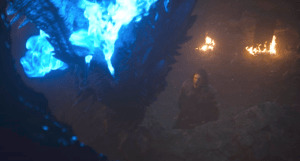 For all the technical wizardry that has gone into creating this single episode of television, the image that may have stayed with me the most is of Sam, late in the battle, lying on a mound of corpses, stabbing wildly at any undead that approach. It’s such an effective moment and one that springs to mind whenever I now think of the show overall, proof that in the midst of all the CGI and unbelievable scale, it’s the characters and their personal struggles that truly make the series powerful. But, as I begin to delve deeper into some of the storytelling pitfalls, I don’t want to just cast aside these technical aspects of the show. They truly are incredible, from the visual effects of seeing the dragons rise above the clouds to the work done by stunt performers who never get enough recognition. The same can be said for the show’s secret weapon, composer Ramin Djawadi, whose score for the episode puts all his talents on show. The episode combines all of these aspects into one thrilling montage as the Night King approaches Bran and the battle rages on, cutting between every character making their last stand as the chilling piano score plays. It’s a sequence that’s edited to perfection and stands among the very best the series has ever produced.
For all the technical wizardry that has gone into creating this single episode of television, the image that may have stayed with me the most is of Sam, late in the battle, lying on a mound of corpses, stabbing wildly at any undead that approach. It’s such an effective moment and one that springs to mind whenever I now think of the show overall, proof that in the midst of all the CGI and unbelievable scale, it’s the characters and their personal struggles that truly make the series powerful. But, as I begin to delve deeper into some of the storytelling pitfalls, I don’t want to just cast aside these technical aspects of the show. They truly are incredible, from the visual effects of seeing the dragons rise above the clouds to the work done by stunt performers who never get enough recognition. The same can be said for the show’s secret weapon, composer Ramin Djawadi, whose score for the episode puts all his talents on show. The episode combines all of these aspects into one thrilling montage as the Night King approaches Bran and the battle rages on, cutting between every character making their last stand as the chilling piano score plays. It’s a sequence that’s edited to perfection and stands among the very best the series has ever produced.
Continuing on from the previous episode, the first 15 minutes or so of ‘The Long Night’ builds tension for the coming conflict, beginning with one long shot following Sam walking through the castle on his way to the front line. Occasionally the camera will linger or follow other characters, watching them take their positions, my favourite being Bran who is seen being taken to the Godswood with the shot purposefully showing him flanked by the tower he fell from in the pilot episode and the tree he now finds himself connected to as a the Three-Eyed Raven. It’s a great way to open the episode because it lays out the geography of Winterfell and shows us the position of nearly every main character so when frozen shit hits the fan the audience isn’t lost. Once Sam reaches the front line, Melisandre arrives to initiate the final part in her mysterious plot, literally bringing fire to battle the ice by lighting the Dothraki swords aflame. The horsemen charge into battle and it’s a really chilling moment to see the lit swords go out one by one as their shouts are silenced by unseen forces. The dead then come for the living and all hell breaks loose for 50 minutes of supernatural action that the series has been building towards since the very beginning.
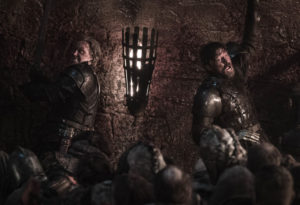 While we often cut to different perspectives and mini-battles within the major clash, it feels like some characters don’t quite get their due and are missing from the screen for too long. Mainly I’m talking about those fighting on the castle’s outer wall and inside the keep, such as Tormund, Jaime, Brienne, Grey Worm and even Jorah and Ghost. I remember my first time watching the episode and wondering if I had lost track of what certain characters were doing. Did I miss a key death in the chaos? Was one of the many fake outs actually real and I don’t realise Jaime is dead? I was also terrified the episode was going to end any minute and finish on a cliffhanger. But, on rewatch, knowing everything that’s about to transpire, who lives and who dies, I could just sit back and enjoy the episode. Kind of like what Bran did for the whole episode. He couldn’t warg into something or aid the fight in any way? He does nothing but take control of a bird to give us a literal bird’s eye view of the battle. Bran the camera man.
While we often cut to different perspectives and mini-battles within the major clash, it feels like some characters don’t quite get their due and are missing from the screen for too long. Mainly I’m talking about those fighting on the castle’s outer wall and inside the keep, such as Tormund, Jaime, Brienne, Grey Worm and even Jorah and Ghost. I remember my first time watching the episode and wondering if I had lost track of what certain characters were doing. Did I miss a key death in the chaos? Was one of the many fake outs actually real and I don’t realise Jaime is dead? I was also terrified the episode was going to end any minute and finish on a cliffhanger. But, on rewatch, knowing everything that’s about to transpire, who lives and who dies, I could just sit back and enjoy the episode. Kind of like what Bran did for the whole episode. He couldn’t warg into something or aid the fight in any way? He does nothing but take control of a bird to give us a literal bird’s eye view of the battle. Bran the camera man.
When you think of Game of Thrones, for better or worse, you think of death. But in many ways, character deaths are misunderstood in the show. People see it as the series where anyone can die at any time. That’s simply not true. Looking back on them, every big death meant something at that specific time. The character’s purpose to the story was fulfilled and their death was their final – but vital – contribution to the narrative. It inspired other character choices that propelled the story or gave weight and meaning to fateful decisions. The drama of the series hinges on consequences and character deaths help enforce it. There was always ‘plot armour’, it’s just that the series did a fantastic job of hiding it. But here, at the final battle with Death itself, more characters needed to die. Deaths would have imbued the battle with the weight it deserved and crucially needed. It didn’t need to be a total bloodbath; not everyone needed to die. I’m happy with the lives some characters go on to lead but not all of them (Jaime). This was the battle the entire ‘Beyond the Wall’ storyline was leading towards and yet almost everyone survives, making the entire story lose all weight and have no consequences. It’s almost as if it never happened.
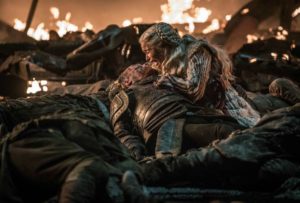 Those who do ultimately perish are obvious from the outset, with Ed dying first. He dies in the first onslaught after saving Sam, a noble death but foreseeable. Next is Lyanna, who became a recurring character due to her popularity with fans and not because she’s in any way important, and she gets a fun death; the smallest warrior killing an undead giant with her last breath. Then Beric falls saving Arya. It’s a death he himself has been predicting for quite some time and it feels right. The follower of the Lord of Light saving the ‘Prince(ess) That Was Promised’ from the Night King’s forces. He even unsubtly dies performing a Christ pose to block the undead.
Those who do ultimately perish are obvious from the outset, with Ed dying first. He dies in the first onslaught after saving Sam, a noble death but foreseeable. Next is Lyanna, who became a recurring character due to her popularity with fans and not because she’s in any way important, and she gets a fun death; the smallest warrior killing an undead giant with her last breath. Then Beric falls saving Arya. It’s a death he himself has been predicting for quite some time and it feels right. The follower of the Lord of Light saving the ‘Prince(ess) That Was Promised’ from the Night King’s forces. He even unsubtly dies performing a Christ pose to block the undead.
Theon dies at the perfect time for his arc and he gets a nice moment with Bran, the boy he once tried to kill and now dies to protect. By saving Yara he proved himself a Greyjoy and now he shows himself as a true Stark by shielding Bran. Jorah is the first into battle and the last to die from the dead, which is very fitting. He stays standing until just after the last of his enemies fall, protecting his beloved Daenerys. I’m a fan of the character and this was a good death for him, and of course is needed to set-up where Dany’s arc will take her next. And then the episode ends with Melisandre walking into the cold, the magic draining from her, paralleling the opening of the episode, as she collapses and dies. It’s… fine. She’s served her purpose in the show and that’s literally why and how she dies. Her purpose in the conflict is complete and so her long life is put to an end.
Game of Thrones has been gloriously free of the standard TV logic problems in the past but sadly some of them make their way into ‘The Long Night’. Many of the main characters stand at the front line, encountering the full force of the undead, and yet survive and retreat rather easily. The plot armour is laid bare by the end of the episode when all the extras are lying on the floor dead and the only people still fighting in the shot are the main characters, unbelievably still living. And just as a personal nit-pick, this was the last chance to see “pale spiders as big as hounds”. I’ve been a little bit too obsessed with this line from the books since I first read it, and even more so after these Ice Spiders were mentioned a couple of times in the series. As a fan of giant spiders – in fiction not real life – I’m very disappointed they never appeared in the show. Benioff and Weiss were obsessed with getting an undead polar bear in the show – which they did in season 7 – but why couldn’t they be a fan of Ice Spiders instead?!
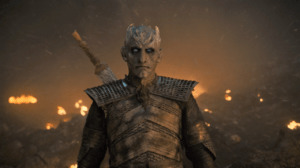 The episode does a superb job of making the villainous Night King an imposing presence in the episode. While I think I still prefer how he looks in ‘Hardhome’, the make-up is great and he’s shot in interesting and imposing ways, despite him doing very little. He’s a force of nature, a weapon of mass destruction turned against his creators and all that is alive, and his army of the dead are treated as such. Their first appearance is really well done with them essentially being a wave of dead sprinting at Winterfell, tumbling over one another. As in previous episodes, the Night King elevating his arms to raise the newly fallen into his ranks of undead is incredibly eerie, especially seeing the eyes of characters like Ed and Lyanna turn blue. The show did miss a trick by not having a member of the living have to fight and kill the reanimated cadaver of someone they cared for. I can’t believe over eight seasons the show didn’t do that once. Imagine how cool it would be to see Sam have to fight his friend Ed who just died saving his life. Or even if Jaime fell and Brienne had to put him down for good.
The episode does a superb job of making the villainous Night King an imposing presence in the episode. While I think I still prefer how he looks in ‘Hardhome’, the make-up is great and he’s shot in interesting and imposing ways, despite him doing very little. He’s a force of nature, a weapon of mass destruction turned against his creators and all that is alive, and his army of the dead are treated as such. Their first appearance is really well done with them essentially being a wave of dead sprinting at Winterfell, tumbling over one another. As in previous episodes, the Night King elevating his arms to raise the newly fallen into his ranks of undead is incredibly eerie, especially seeing the eyes of characters like Ed and Lyanna turn blue. The show did miss a trick by not having a member of the living have to fight and kill the reanimated cadaver of someone they cared for. I can’t believe over eight seasons the show didn’t do that once. Imagine how cool it would be to see Sam have to fight his friend Ed who just died saving his life. Or even if Jaime fell and Brienne had to put him down for good.
While watching this episode I was conflicted on whether or not ‘The Long Night’ should be judged as a finale. It’s the end of a significant storyline in the show and, despite the number of characters who survive with unknown futures, there’s a finality to it. I’m not saying to ignore the following three episodes and consider this the very end of the show, but rather I’m asking whether it’s fair to consider the final season as a finale in six parts. Is this just as much a finale as the actual finale in three episodes time? Did this battle take place at the right time, three episodes into a season of six? I think my struggle with this comes from the fact that when the show does conclude with the ‘real’ finale, this episode and the entire White Walker storyline feels irrelevant. There are almost no consequences to this huge apocalyptic battle. It’s a side plot that could easily be eliminated; enjoyable but ultimately unnecessary. Instead of the literal coming of Death meaning something after it’s all said and done, revealing some new narrative or thematic message, it’s promptly forgotten and was nothing but a cool action sequence.
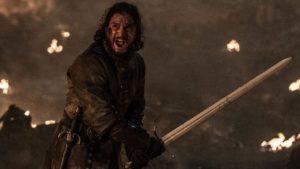 The Night King is dead, seemingly for ever, but why was he even ‘alive’ if the battle doesn’t change anything? Of course, characters were brought together, developed relationships and some either killed or irrevocably changed, which bled into the main plot of the quest for the Iron Throne, but the two storylines feel too distinct. We have the war in the North against the Night King and then we have the war to see who will be named King or Queen in the South. Essentially, the first three episodes of the season tell one story and the final three tell another, with them having surprisingly little impact on one another. The war for Westeros and the war for the throne should be one and the same, or at least linked somehow. After so much set-up it’s disappointing that the dead only made it to Winterfell and got nowhere close to King’s Landing. The South was never in danger and the southern forces were unneeded, despite us repeatedly being told otherwise. It’s somewhat disappointing that the South will never know what happened, but is that the point? Real history is often narratively unsatisfying and so is there a conscious attempt to make Westerosi history follow suit?
The Night King is dead, seemingly for ever, but why was he even ‘alive’ if the battle doesn’t change anything? Of course, characters were brought together, developed relationships and some either killed or irrevocably changed, which bled into the main plot of the quest for the Iron Throne, but the two storylines feel too distinct. We have the war in the North against the Night King and then we have the war to see who will be named King or Queen in the South. Essentially, the first three episodes of the season tell one story and the final three tell another, with them having surprisingly little impact on one another. The war for Westeros and the war for the throne should be one and the same, or at least linked somehow. After so much set-up it’s disappointing that the dead only made it to Winterfell and got nowhere close to King’s Landing. The South was never in danger and the southern forces were unneeded, despite us repeatedly being told otherwise. It’s somewhat disappointing that the South will never know what happened, but is that the point? Real history is often narratively unsatisfying and so is there a conscious attempt to make Westerosi history follow suit?
So, who slays the Night King and puts an end to his threat? Well, Arya of course. This was certainly a surprising turn of events, with Jon or even Daenerys being the top candidates. A twist to be sure and now, upon rewatch, I can safely say that I love the decision. I’m guessing Arya won’t strike the fateful blow in the books but they’re separate entities from the show and I think this decision works for the series. Some people who are desperate for the next novel are judging the show as though it is the next book, finally revealing answers teased since 1996, but that’s not what it is. Arya is the ‘Prince That Was Promised’ in the show and because we’ve been given much less information about what this prophecy means in the series when compared to the books, it fits. I think some readers are bringing information we only learn in the books to the show, and that’s unfair. And who’s to say she actually is Azor Ahai reborn? Maybe Jon still is and the prophecy speaks of his killing of Daenerys rather than the death of the Night King. Prophecies are supposed to be vague and open to interpretation. Once a clear answer is revealed, they become uninteresting.
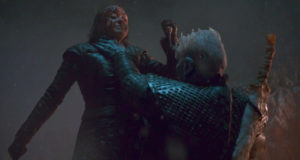 If there is to be a separation between the ‘throne plot’ and the ‘winter plot’ then I like this twist in Arya’s arc. We all thought her destiny lay in the throne plot, to kill Cersei or some other such grandiose deed, but instead her entire training led her to ending the winter storyline, killing the Night King. I don’t know if this was always the plan, the “not today” and Melisandre’s quote about blue eyes feel a bit like retconning and happy accidents, but they work well enough in bringing her meandering journey to this significant endpoint. We thought Jon’s endgame was the Night King storyline but, with the revelation about his heritage, he’s tied to the thrones plot, even if he does ultimately reject it.
If there is to be a separation between the ‘throne plot’ and the ‘winter plot’ then I like this twist in Arya’s arc. We all thought her destiny lay in the throne plot, to kill Cersei or some other such grandiose deed, but instead her entire training led her to ending the winter storyline, killing the Night King. I don’t know if this was always the plan, the “not today” and Melisandre’s quote about blue eyes feel a bit like retconning and happy accidents, but they work well enough in bringing her meandering journey to this significant endpoint. We thought Jon’s endgame was the Night King storyline but, with the revelation about his heritage, he’s tied to the thrones plot, even if he does ultimately reject it.
The episode concludes with Melisandre walking out into the cold and dying, her role completed, as a new day dawns on Westeros after its longest and darkest night. And boy, what a night. The episode certainly has flaws, many of which become apparent when it’s viewed as a chapter in this ongoing narrative rather than its own instalment. The writers chose to have this storyline go out with scale rather than meaningfulness. It’s a huge battle that feels vitally important and serious as it’s happening, but once it’s over there are shockingly few consequences. But it sure is entertaining. I love watching it and it’s well-executed but I don’t think it’s the path they should have gone down. I’m mixed-to-positive on ‘The Long Night’, as boring as that sounds for a ginormous episode in the middle of a season of television that often creates extreme reactions. It’s the best battle sequence the series ever did in terms of the incredible levels of craftsmanship and epic scale, but its ultimate lack of narrative satisfaction make ‘Hardhome’ and ‘Battle of the Bastards’ superior. It’s a problematic end to the northern threat storyline but, as we approach the ending of the series, with just three episodes to go, it’s about to get worse.
Do you see ‘The Long Night’ as a tipping point in Game of Thrones’ overall quality? Do you enjoy the episode and its scale despite its storytelling shortcomings, or are you pleased with how the story played out? Let me know in the comments and be sure to geek out with me about TV, movies and video-games on Twitter @kylebrrtt. Join me next week when, exactly one year after its first airing, I revisit the fourth episode of the final season, ‘The Last of the Starks’, which I believe is the worst episode of the entire series.






